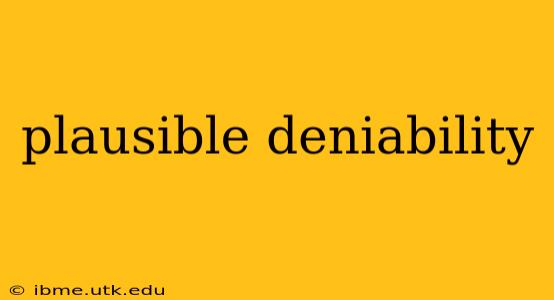Plausible deniability is a strategy used to shield someone from culpability in an action or event. It's the ability to deny involvement in something, even if there's some evidence suggesting otherwise, because that evidence isn't strong enough to definitively prove guilt. This concept is often discussed in the context of politics, espionage, and corporate scandals, but understanding its nuances requires a deeper look.
What does plausible deniability mean?
At its core, plausible deniability means creating a situation where someone can reasonably deny involvement in a questionable activity. This isn't about outright lying; rather, it's about constructing a scenario where doubt remains. The key is the word "plausible." The denial must be believable, even if it isn't entirely truthful. This often involves carefully planned actions and a lack of clear, direct evidence linking the individual to the act.
How is plausible deniability achieved?
Achieving plausible deniability involves a combination of strategies, often including:
- Lack of Direct Evidence: The absence of direct evidence, such as emails, memos, or witness testimonies, makes it difficult to definitively prove someone's involvement.
- Chain of Command: Actions are often delegated through multiple layers, obscuring the origin of decisions and making it harder to pinpoint individual responsibility.
- Information Silos: Compartmentalizing information, preventing different parts of an organization from having a complete picture, allows for deniability at various levels.
- Ambiguous Instructions: Using vague or indirect language when directing others to perform certain tasks removes a clear connection to specific outcomes.
- Loose Oversight: A lack of strict supervision or accountability allows for actions to be taken without proper authorization or record.
What are some examples of plausible deniability?
While specific instances often involve sensitive information and are not publicly available, hypothetical examples can illustrate the concept:
- A government official denying knowledge of a covert operation: The official might claim ignorance of the operation's details, even if they approved the funding or resources.
- A corporate executive denying awareness of illegal activities within their company: The executive might claim that the activities were conducted without their knowledge or approval, despite indirect evidence suggesting otherwise.
- A manager denying they authorized an unethical action by a subordinate: The manager might claim they weren't aware of the action, even if they created a culture that allowed or encouraged it.
These scenarios highlight how plausible deniability relies on a lack of clear, irrefutable evidence and the exploitation of organizational structures or communication gaps.
Is plausible deniability always unethical?
The ethical implications of plausible deniability are complex. While it can be used to protect individuals from undeserved blame, it can also be employed to shield those responsible for wrongdoing. The ethics depend entirely on the context and the intent behind its use. If used to prevent the exposure of illegal or unethical activities, it's widely considered unethical. However, in situations where it protects individuals from being unfairly blamed for actions they didn't directly undertake, it may be viewed more neutrally.
What are the legal implications of plausible deniability?
The legal implications of plausible deniability are equally complex and vary based on jurisdiction and specific circumstances. While it's not a legal defense in itself, it can impact the success of legal proceedings by making it more difficult to prove guilt beyond a reasonable doubt. This often leads to protracted legal battles and, potentially, the avoidance of legal repercussions for the individuals involved.
How can plausible deniability be prevented?
Preventing plausible deniability requires establishing clear lines of accountability, fostering transparent communication, implementing robust oversight mechanisms, and documenting all decisions and actions meticulously. A strong ethical culture and a commitment to transparency are essential for preventing its use as a tool for covering up wrongdoing.
This exploration of plausible deniability provides a comprehensive overview of the concept, its mechanisms, implications, and preventative measures. While its application is multifaceted, understanding its subtleties is crucial in various contexts, promoting accountability and transparency in organizations and public life.
